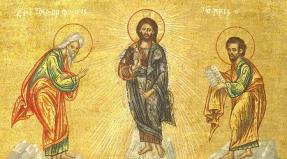From what age you can become a godmother. What are christening gifts? When there is no need for godparents
At what age the child's parents decide to baptize. But when choosing the time of Baptism for your baby, you should remember some peculiarities, after Baptism you can already pray for the child in the Church, submit notes, bring to the Holy Chalice during Communion. For Christian parents, a natural desire is the desire to perform the Sacrament of Baptism on their baby as early as possible. If a child is born in a difficult physical condition, then he can be baptized immediately after birth. If the baby is feeling well, then they are usually baptized no earlier than the fortieth day after birth. This is due to the fact that during this period of time the mother of the child is considered unclean, she has natural discharge after childbirth. Also, she may feel weak, forty days is given to her to restore her physical strength, during this period she should not enter the Church. Many mothers want to be present at the time of Baptism themselves; they can do this only after a forty-day period and after the priest has read special prayers over them in the Church. Also, there is a tradition of Baptism on the fortieth day after birth, which is associated with the Feast of the Presentation of the Lord and with the Old Testament traditions, according to these traditions, on the fortieth day after birth, the child's parents had to bring a sacrifice to the temple. The Blessed Virgin Mary and Elder Joseph during their sacrifice met Elder Simeon, he was a symbol of the Old Testament. The newborn Savior symbolized the New Testament. Elder Simeon blessed the baby and said a famous prayer, which begins with the words "Now let go ...". Thus, the combination and blessing of the Old Testament and the Old Testament of the New Testament took place symbolically.
At what age are newborn children baptized?
At what age newborn children are baptized, there are no strict rules in the Church; parents can baptize a child both before the expiration of the forty-day period after his birth, and after him. The rules of Baptism presuppose the obligatory presence of godparents or foster parents for the child. This is due to the fact that the baby is not able to realize the Sacrament being performed and give an answer for his Confession of the Christian Faith. The receivers do it for him. At what age to baptize a baby may depend on both his condition and the desire and degree of church-going of the parents. As a rule, religious parents baptize their children immediately after the expiration of the forty-day period after childbirth. It is not necessary to baptize the child strictly on the fortieth day, if it is convenient for you to do it on the next Sunday, when close relatives and friends can gather for christening, then you can safely postpone it a little. There are cases when the fortieth day falls on the time of fasting, it is also better not to arrange christening during fasting, since breaking the fast can commit a sin. And if you set the table only with lean dishes, then you can greatly limit the number of treats for dear guests. At what age it is better to baptize a child, you can consult with deeply religious pious people, with priests. Some parents want to clarify the following wording of the question: "At what age can a child be baptized?" According to the canons of the Orthodox Church, a person can be baptized at absolutely any age, both from the moment of birth and until the last breath. At what time you need to baptize a child, you decide for yourself, but you always need to remember to whom the Church is not the Mother, to whom God is not the Father, as the Holy Fathers said. They insisted on human participation in the Church life from the moment of spiritual birth. The earlier the spiritual birth, that is, the Sacrament of Baptism occurs, the more opportunities to nourish the soul of a person with spiritual grace, which is in the Church. The earthly life of every person is fleeting and fast-flowing, it is like a rushing river, into the waters of which it is impossible to step twice, so every moment of our life flies quickly and irrevocably leaves. A person will give an answer before God for his every thought, deed and intention. The Church encourages us to take a responsible approach to every step of our life. Parents are responsible before God not only for themselves, but also for their children, therefore, the Sacrament of Baptism and their Church life must be approached with special comprehension and responsibility.
What is needed to baptize a child?
What is needed for the baptism of a child is, first of all, an awareness of the spiritual need for this Holy Sacrament. The child still cannot tell you how much he needs protection from God and blessed consolation, but the fact that after performing Baptism and participating in the Sacrament of the Sacrament, children become much calmer, sleep better, show more joyful and positive emotions, testifies to the fact that that their soul and body feel the special grace of God. For the Baptism of a child, it is necessary that his parents and godparents undergo a special interview before Baptism. You also need to prepare a pectoral cross and a chain, a baptismal set for a child, a baptismal towel, and a diaper. Parents and godparents should know special prayers, the priest should inform you about all these points during the interview, you can also prepare the questions you are interested in and write them down in advance on a piece of paper and take them with you, so as not to forget to ask the priest. If you are tormented by doubts about at what age to baptize a child, then you can also consult with the priest on this matter.
Becoming godparents means taking on a huge responsibility towards the child of relatives or friends. After all, it is the godparents who replace the family for children if something happens to their parents. They take care of them, help them in their daily life. How old can you be a godfather?
Special requirements for the godfather
Godparents are not the people who congratulate on christenings and give gifts a couple of times a year. Real godparents take care of the spiritual development of the child, therefore they themselves must be baptized and. To become a godfather, you must:
Such a godparent should be under ideal conditions. But since we are all ordinary people with our passions and aspirations, some of these points are not fulfilled by us at all.
The godfather should not interfere with the upbringing of the godson or goddaughter, but it is necessary to help bring up your spiritual children. Also, there may be one godfather, but for a boy it must be a baptized man, and for a girl - a baptized woman.
Now you know how old you can be a godfather. But what responsibilities are assigned to a young man or a man with such an honorary title?
The godfather is the child's first helper after his own father. He also helps the godfather's family if any problems begin there. Being godparents is a colossal burden of responsibility. Earlier in Russia, if trouble happened to the parents, the godparents took the child into their family. Things are a little different today.
The godfather must often communicate with the child. Give gifts at will. Attend the most important social events that will be meaningful to the child.
But the most important thing is that the godfather must strengthen faith in God in the heart of the child. He himself must be an example to follow. And this example should be positive.
If the godfather was at first a worthy person, and then for some reason began to sink and degrade, and also live in sin, then the family of a small or adult godson should pray for him. And to help him to the best of his ability, as if he himself helped the godson.
All judgments that an unmarried young man should not be a godfather, otherwise his children will not be, are from the point of view of the Orthodox Church superstition.
If it is impossible to choose a godfather from the inner circle, then one of the male relatives becomes him. There is one prohibition here: married spouses cannot be godparents of one child.
The institute of godparents is reviving again today, and there was a period when it was a pure formality. The decision to be or not to be a godfather, of course, is made by the person himself, but no matter how he decides, he must remember that everything will have to be held accountable before the Lord.

Why do you need a godfather?
Godparents are called receivers in the church. The more receivers a child has, the better, although one deeply spiritual person is enough.
The godfather, as it were, is a certain "insurance" that someone close will be engaged in the spiritual development of the child. If the parents do not do this, then this honorable duty is assigned to the godfather. The godfather is also a witness to the sacrament of baptism.
So how old can you be a godfather? The Synod has established a certain age, but it is best to do this when personal churching has already taken place. A conscious approach to baptism helps a person become richer in soul, develops him spiritually. Therefore, if there are no worthy people around the child for the role of a godfather, then it is better to baptize without a godfather at all than to take the first person who comes across for his role.
Godparents: Who Can Become a Godfather? What does a godmother and godfather need to know? How many godchildren can you have? Answers in the article!
Briefly:
- Godfather, or successor, should be Orthodox Christian. The godfather cannot be a Catholic, a Muslim, or a very good atheist, because main duty godfather - to help the child grow up in the Orthodox faith.
- Godfather must be a church man, ready to regularly take the godson to church and monitor his Christian upbringing.
- After being baptized, godfather cannot be changed, but if the godfather has changed a lot for the worse, the godson and his family should pray for him.
- Pregnant and unmarried women CAN be godparents of both boys and girls - don't listen to superstitious fears!
- Godparents there can be no father and mother of the child, as well as a husband and wife cannot be godparents of one child. other relatives - grandmothers, aunts and even older brothers and sisters can be godparents.
Many of us were baptized in infancy and no longer remember how it happened. And then one day we are invited to become a godmother or godfather, or maybe even more joyful - we have our own child. Then we once again think about what the Sacrament of Baptism is, whether we can become someone's godparents and how we can choose recipients for our child.
Answers by Archpriest Maxim Kozlov to questions about the duties of godfathers from the site "Tatiana's Day".
- I was invited to become a godfather. What am I supposed to do?
- Being a godfather is both honorable and responsible.
The godmother and father, participating in the Sacrament, take responsibility for the little member of the Church, so they must be Orthodox people. Of course, a person should become a godparent who, moreover, has some experience of church life and will help parents raise a baby in faith, piety and purity.
During the performance of the Sacrament over the infant, the godfather (of the same sex as the child) will hold him in his arms, recite the Creed and vows of renunciation of Satan and union with Christ on his behalf. Read more about the procedure for performing Baptism.
The main thing in which the godfather can and should help and in which he undertakes an obligation is not only to be present at Baptism, but also then to help the one received from the font to grow, strengthen in church life, and in no case limit your Christianity only to the fact of Baptism. According to the teaching of the Church, the way we took care of the fulfillment of these duties, we will be asked on the day of the last judgment, as well as for the upbringing of our own children. Therefore, of course, the responsibility is very, very large.
- And what to give to the godson?
- Of course, you can give your godson a cross and a chain, no matter what they are made of; the main thing is that the cross should be in the traditional form adopted in the Orthodox Church.
In the old days, there was a traditional church christening gift - a silver spoon, which was called "a gift for a tooth", it was the first spoon that was used when feeding a child when he began to eat from a spoon.
- How can I choose godparents for my child?
- Firstly, godparents must be baptized, churched Orthodox Christians.
The main thing is that the criterion for your choice of godfather or godmother is whether this person will subsequently be able to help you in a good, Christian upbringing perceived from the font, and not only in practical circumstances. And, of course, an important criterion should be the degree of our acquaintance and simply the affection of our relationship. Think about whether your chosen godfathers will be the church educators of the child or not.
- Is it possible for a person to have only one godparent?
- Yes it is possible. It is only important that the godparent is of the same gender as the godson.
- If one of the godparents cannot attend the Sacrament of Baptism, is it possible to carry out the ceremony without him, but write him down as a godparent?
- Until 1917, the practice of absentee godparents existed, but it was applied only in relation to persons of the imperial family, when, as a sign of royal or grand-ducal favor, they agreed to be considered godparents of this or that infant. If we are talking about a similar situation, do so, and if not, then perhaps it is better to proceed from generally accepted practice.
- Who can't be godfather?
- Of course, non-Christians - atheists, Muslims, Jews, Buddhists and so on - cannot be godparents, no matter how close friends of the child's parents and no matter how pleasant people they are in communication.
An exceptional situation - if there are no close people close to Orthodoxy, and you are sure of the good morals of a heterodox Christian, then the practice of our Church allows one of the godparents to be a representative of another Christian confession: Catholic or Protestant.
According to the wise tradition of the Russian Orthodox Church, a husband and wife cannot be godparents of the same child. Therefore, it is worth considering if you and the person with whom you want to start a family are invited to become recipients.
- And which of the relatives can be godfather?
- An aunt or uncle, grandmother or grandfather can become the recipients of their little relatives. It should only be remembered that a husband and wife cannot be godparents of one child. However, it is worth thinking about this: our close relatives will still take care of the child, help us raise him. In this case, do we not deprive the little person of love and care, because he could have one or two more adult Orthodox friends, whom he could turn to throughout his life. This is especially important at a time when the child is looking for authority outside the family. The godfather at this time, in no way opposing himself to his parents, could become the person whom the teenager trusts, from whom he asks for advice even about what he does not dare to tell his loved ones.
- Is it possible to refuse godparents? Or to baptize the child for the purpose of normal education in the faith?
- In any case, a child cannot be re-baptized, for the Sacrament of Baptism is performed once, and no sins of either the godparents, or his own parents, or even the person himself cancel all those grace-filled gifts that were given to a person in the Sacrament of Baptism.
As for communication with godparents, then, of course, betrayal of faith, that is, falling away into certain heterodox confessions - Catholicism, Protestantism, all the more falling away into certain non-Christian religions, godlessness, a blatantly impious way of life - in fact, they say that that the person has not coped with his duty as godfather. The spiritual union, concluded in this sense in the Sacrament of Baptism, can be considered terminated by the godmother or godfather, and you can ask another churchly pious person to take a blessing from his confessor to bear the care of the godfather or godmother about this or that child.
- I was invited to be the girl's godmother, but everyone tells me that the boy must be baptized first. Is it so?
- The superstitious idea that a girl should have a boy as the first godson and that a baby girl taken from the font will become an obstacle to her subsequent marriage has no Christian roots and is an absolute invention, which an Orthodox Christian woman should not be guided by in any way.
- They say that one of the godparents must be married and have children. Is it so?
- On the one hand, the opinion that one of the godparents must necessarily be married and have children is a superstition, just like the idea that a girl who has taken a girl from the font will either not marry herself, or it will impose on her fate some kind of imprint.
On the other hand, in this opinion you can see a certain kind of sobriety, if you do not approach it with a superstitious interpretation. Of course, it would be reasonable if people (or at least one of the godparents) who have sufficient life experience, who already have the skill of raising children in faith and piety, who have something to share with the physical parents of the baby, are chosen as the godparents of the baby. And it would be highly desirable to look for such a godfather.
- Can a pregnant woman be a godmother?
- Church statutes do not prevent a pregnant woman from being a godmother. The only thing I urge you to think about is whether you have the strength and determination to share the love for your own child with the love for the perceived baby, will you have time to take care of him, for advice to the baby's parents, in order to sometimes warmly pray for him , bring to the temple, somehow be a kind elder friend. If you are more or less confident in yourself and circumstances allow, then nothing prevents you from becoming a godmother, and in all other cases, it may be better to measure seven times before cutting off once.
About godparents
Natalia Sukhinina
“Recently I got into a conversation on the train with a woman, or rather, we even argued with her. She argued that godparents, like mother and father, are obliged to bring up their godson. And I do not agree: a mother is a mother, whom she will allow to interfere in the upbringing of the child. I, too, once had a godson in his youth, but our paths ran away long ago, I don't know where he lives now. And she, this woman, says that now I will have to answer for him. To answer for someone else's child? Something I can't believe ... "
(From a letter from a reader)
 It so happened, and my life paths veered in a completely different direction from my godparents. Where they are now, how they live, and whether they are even alive at all, I do not know. Even their names could not be kept in memory, they baptized me long ago, in infancy. I asked my parents, but they themselves do not remember, they shrug their shoulders, they say, people lived in the neighborhood at that time, and they were invited to be godparents.
It so happened, and my life paths veered in a completely different direction from my godparents. Where they are now, how they live, and whether they are even alive at all, I do not know. Even their names could not be kept in memory, they baptized me long ago, in infancy. I asked my parents, but they themselves do not remember, they shrug their shoulders, they say, people lived in the neighborhood at that time, and they were invited to be godparents.
And where are they now, how to call them, dignify, do you remember?
Honestly, for me this circumstance has never been a flaw, I grew and grew, without godparents. No, I cheated, it was once, I was jealous. A school friend got married and received a golden chain as thin as a spider's web as a wedding present. The godmother gave it, she boasted to us, who could not even dream of such chains. That's when I was jealous. If I had a godmother, maybe I would ...
Now, of course, after living and thinking, I regret very much about my occasional "father and mother" who do not even remember that I remember them now in these lines. I remember without reproach, with regret. And, of course, in the dispute between my reader and her fellow traveler on the train, I am completely on the side of my fellow traveler. She is right. To hold us accountable for the godchildren and godchildren scattered from their parents' nests, because they are not random people in our life, but our children, spiritual children, godfathers.
Who doesn't know this picture?
Dressed people stand to the side in the temple. The center of attention is a baby in lush lace, he is passed from hand to hand, goes out with him, distracted so that he does not cry. They are waiting for christening. They look at their watch, get nervous.
Godmother and father can be recognized immediately. They are somehow especially focused and important. They are in a hurry to get their wallet to pay for the upcoming christening, give some orders, rustle with bags of baptismal clothes and fresh diapers. The little man does not understand anything, goggles at the wall frescoes, at the chandelier lights, at the "persons accompanying him", among which the face of the godfather is one of many. But the priest invites - it's time. They fussed, worried, the godparents do their best to maintain importance - it does not work, because for them, as well as for their godson, today's exit to God's temple is a significant event.
“When was the last time you were in church?” The priest will ask. They will shrug their shoulders in embarrassment. He may not ask, of course. But even if he does not ask, all the same, by the awkwardness and tension, one can easily determine that the godparents are not church people, and only the event in which they were invited to participate brought them under the arches of the church. Father will ask questions:
- Do you wear a cross?
- Do you read prayers?
- Do you read the Gospel?
- Do you honor the church holidays?
And the godparents will begin to mutter something indistinct, to lower their eyes guiltily. The priest will certainly conscience, remind about the duty of godfathers and mothers, in general about the Christian duty. Hastily and willingly, the godparents will nod their heads, accept humbly conviction of sin, and either from excitement, or from embarrassment, or from the seriousness of the moment, few will remember and let the main father's thought into their hearts: we are all responsible for our godchildren, and now, and ever. And whoever remembers is likely to misunderstand. And from time to time, mindful of his duty, he will begin to invest in the welfare of the godson as much as possible.
The first contribution immediately after the baptism: an envelope with a crispy solid bill - by a tooth. Then, for birthdays, as the child grows, a chic set of children's dowry, an expensive toy, a fashionable satchel, a bicycle, a branded suit, and so on up to gold, to the envy of the poor, wedding chains.
We know very little. And it’s not that bad, but that we don’t really want to know. After all, if we wanted to, before going to church as a godfather, we would have looked there the day before and asked the priest what this step “threatens” us, how worthy to prepare for it.
The godfather is a Slavic recipient. Why? After immersion in the font, the priest hands the baby into the hands of the godfather. And he accepts, takes it into his own hands. The meaning of this action is very deep. With this perception, the godfather undertakes the honorable, and most importantly, responsible mission of leading the godson along the path of ascent to the Heavenly heritage. That's where! After all, baptism is the spiritual birth of a person. Remember, in the Gospel of John: "Whoever is not born of water and the Spirit cannot enter the Kingdom of God."
In serious words - “keepers of faith and piety” - the Church calls the recipients. But in order to store, you need to know. Therefore, only a believing Orthodox person can be a godfather, and not one who, together with the baptized baby, first got to the church. The godparents should know at least the basic prayers "Our Father", "Virgin Mary", "May God rise ...", they should know the "Symbol of Faith", read the Gospel, the Psalter. And, of course, wear a cross, be able to be baptized.
One father told me: they came to baptize the child, but the godfather without a cross. Father to him: put on the cross, but he - I can't, unbaptized. It’s just an anecdote, but it’s true.
Faith and repentance are two basic conditions for union with God. But one cannot demand faith and repentance from a baby in lace, so the godparents are called, having faith and repentance, to pass them on, to teach them to their successors. That is why they say instead of babies the words of the "Creed" and the words of denial of Satan.
- Do you deny Satan and all his works? The priest asks.
- I deny, - replies the receiver instead of the baby.
The priest is wearing a light festive robe as a sign of the beginning of a new life, which means spiritual purity. He walks around the font, censes it, everyone standing next to the lighted candles. Candles are burning in the hands of the recipients. Very soon, the priest will put the baby into the baptismal font three times, and the wet, wrinkled, at all not understanding where he is and why, the servant of God, will hand him over to the godparents. And he will be dressed in white clothes. At this time, a very beautiful troparion is sung: "Give me light to robe, put on light, like a robe ..." Accept your child, recipients. From now on, your life will be filled with a special meaning, you have taken upon yourself the feat of spiritual parenting, and for how you carry it, you will now hold an answer to God.
At the First Ecumenical Council, a rule was adopted according to which women become receivers for girls, men for boys. Simply put, a girl only needs a godmother, a boy only needs a godfather. But life, as often happens, has made its own corrections here too. According to the ancient Russian tradition, both are invited. Of course, you can't spoil the porridge with butter. But here, too, it is necessary to know quite certain rules. For example, a husband and wife cannot be godparents to one child, just as the parents of a child cannot be godparents to him at the same time. Godparents cannot marry their godchildren.
… Behind the baby's baptism. He has a great life ahead, in which we have a place equal to the father and mother who gave birth to him. Ahead is our work, our constant striving to prepare the godson for the ascent to spiritual heights. Where to begin? Yes, from the smallest. At first, especially if the child is the first, parents are thrown off their feet from the worries that have fallen on them. They, as they say, are not up to anything. Now is the time to lend a helping hand to them.
Carrying the baby to Communion, making sure that icons hang over his cradle, giving notes for him in the church, ordering prayer services, and constantly, like his own blood children, remember in home prayers. Of course, you don’t have to do this edifying, they say, you are mired in vanity, but I’m all spiritual - I think about the high, I strive for the high, I nourish your child so that you can do it without me ... In general, the spiritual education of a child is possible only in if the godfather is his own person in the house, welcome, tactful. It is not necessary, of course, to shift all the worries onto yourself. The responsibilities of spiritual education are not removed from parents, but to help, support, replace somewhere, if necessary, this is mandatory, without this, one cannot justify oneself before the Lord.
This is a really difficult cross. And, probably, you need to think carefully before imposing it on yourself. Will I be able to? Do I have enough health, patience, spiritual experience to become a receiver of a person who is entering life? And parents take a good look at relatives and friends - candidates for the honorary post. Who of them will be able to become a truly kind helper in education, who will be able to give your child true Christian gifts - prayer, the ability to forgive, the ability to love God. And plush bunnies the size of elephants may be fine, but not at all necessary.
If the house is in trouble, then there are other criteria. How many unfortunate, restless children suffer from drunken fathers, unlucky mothers. And how many simply unfriendly, embittered people live under one roof and make children suffer cruelly. Such plots are as old as the world and banal. But if a person who stood with a lit candle in front of the Epiphany font fits into this plot, if he, this person, rushes, as if into an embrasure, towards his godson, he can move mountains. Good that can be done is also good. It is not in our power to ward off a half-liter of a foolish man, to reason with a lost daughter, or to sing "make up, make up, make up" to two frowning halves. But it is in our power to take away a weary little boy to our dacha for a day, enroll him in Sunday school and take the trouble to take him there, and pray. Prayer feat at the forefront of godparents of all times and peoples.
The priests understand well the severity of the heroic deed of the recipients and do not bless to recruit a lot of children, good and different, for their children.
But I know a man who has more than fifty godchildren. These boys and girls are from there, from childhood loneliness, childish sorrow. From a great child's misfortune.
The name of this person is Alexander Gennadievich Petrynin, he lives in Khabarovsk, directs the Children's Rehabilitation Center, or, more simply, in an orphanage. As a director, he does a lot, pushes funds for equipment of classes, selects personnel from conscientious, unselfish people, rescues his wards from the police, collects them in the basements.
Like a godfather, he takes them to church, talks about God, prepares them for Communion and prays. Prays a lot, a lot. In Optina Pustyn, in the Trinity-Sergius Lavra, in the Diveyevo monastery, in dozens of churches throughout Russia, long notes written by him about the health of numerous godchildren are read. He is very tired, this man, sometimes he almost collapses from fatigue. But he has no other choice, he is a godfather, and his godchildren are a special people. His heart is a rare heart, and Father, realizing this, blesses him for such asceticism. A teacher from God, those who know him in business say about him. Godfather from God - can I say so? No, probably all godparents are from God, but he knows how to suffer like a godfather, knows how to love like a godfather, and knows how to save. Like a godfather.
For us, whose godchildren, like the children of Lieutenant Schmidt, are scattered throughout the cities and villages, his ministry to children is an example of a true Christian ministry. I think many of us will not reach his heights, but if we do life with someone, then just with those who understand their title of "recipient", as a serious, and not accidental business in life.
You can, of course, say: I am a weak, busy person, not so hot in the church and the best thing I can do in order not to sin is to refuse the offer to be a godfather altogether. It's more honest and simpler, right? Easier - yes. But more honest ...
Few of us, especially when the time has imperceptibly come to stop, look around, can say to ourselves - I am a good father, a good mother, I owe nothing to my own child. We owe everyone, and the godless time in which our needs, our projects, our passions grew, is the result of our debts to each other. We will not give them back. Children have grown up and do without our truths and our discoveries of America. Parents have grown old. But conscience - the voice of God - itching and itching.
Conscience requires a splash, and not in words, but in deeds. Can't it be such a thing to carry out the duties of the cross?
It is a pity that there are few examples of the feat of the cross among us. The word "godfather" has almost disappeared from our vocabulary. And a great and unexpected gift for me was the recent wedding of the daughter of my childhood friend. Rather, not even a wedding, which is a great joy in itself, but a feast, the wedding itself. And that's why. We sat down, poured wine, waiting for the toast. Everyone is somehow embarrassed, the bride's parents let the groom's parents go ahead with the speeches, they are the other way around. And then a tall and handsome man stood up. He got up somehow very businesslike. Raised a glass:
- I want to say, as the godfather of the bride ...
Everyone was quiet. Everyone listened to the words that young people should live long, amicably, with many children, and most importantly, with the Lord.
- Thank you, godfather, - said the charming Yulka and from under the luxurious foaming veil gave the godfather a grateful glance.
Thank you godfather, I thought too. Thank you for bringing love to your spiritual daughter from the baptismal candle to the wedding candle. Thank you for reminding us all of what we have completely forgotten about. But we have time to remember. How much - the Lord knows. Therefore, we must hurry.
The baptism of a child is an important, perhaps even the main event, both in his life and in the life of his parents. But how to properly prepare for baptism, how to choose godparents, and why are they now holding public talks in Saratov churches before baptism? We asked these questions to the cleric of the Holy Trinity Cathedral in Saratov, Hierodeacon Paisiy (Shurukhin).
PREPARATION
- Father Paisiy, I know that you conduct public talks before the baptism of children. How long ago was this innovation introduced in the Saratov churches and why?
Such conversations are held before the baptism of not only children, but also adults, this is not a novelty. Announcement talks as a message of Christian teaching to those entering the Church have been held in the Church since its inception. The Lord said to the apostles: “... go, teach all nations, baptizing them in the name of the Father and the Son and the Holy Spirit, teaching them to observe everything that I have commanded you” (Matthew 28, 19). This "teach" is the Lord's instruction on the need to teach the basics of faith before being baptized.
Teaching the basics of the Christian faith was already known in the apostolic period of the Church: it is known that the apostle and evangelist Mark founded the catechumens (Alexandrian) school for the instruction of converts. The proclamation in the ancient Church took from forty days to three years. The catechuchman was supposed to have a recipient - a witness who vows to the bishop or presbyter for the sincerity of the intentions of the person wishing to become a member of the Church.
In pre-revolutionary Russia, the announcement took place for six weeks. Only then could a person be baptized. The situation changed in the Soviet years, when the announcement and baptism itself were practically prohibited. Only recently has the state ceased to be an implacable enemy of the Church, and now the practice of publicity has been reintroduced. Each person should be familiar with the basic principles of our faith, be able to correctly substantiate why he believes so, explain how Orthodoxy differs from other religions and confessions.
Now we have two conversations for one and a half to two hours, more people can not stand it.
- Do you have public talks with your parents and godparents?
We must prepare people for their future responsibility - to be godparents. Therefore, conversations are obligatory for godparents. Of course, the presence of parents is also desirable.
SELECTION OF GOD
Father Paisiy, tell me, can any people from the parents' environment become godparents, or should godparents still be churched people?
The latter is a must. The godparents must be not only baptized, but also churched people. Unfortunately, at present this is not always observed, and when you talk with godparents at public talks, they cannot even read the Symbol of Faith by heart (a summary of the Orthodox doctrine).
One day a man approached me and asked why we needed public talks, said: "I am already a godfather, I have godchildren, and I want to become a godfather again."
In the conversation, it turned out that he did not know the Symbol of Faith, he himself was not churchgoed, and he had never brought a single godson to the church for Communion. We just sat at the table after the baptism and went our separate ways. There is no spiritual education of godchildren, but this should not be so: how can a person be responsible for something that he has no idea about? And godparents are, first of all, spiritual educators. If the child's father and mother are his physical parents, then the godparents are his spiritual mentors, they are obliged to help the godson become an Orthodox person. When a child is baptized, they make serious vows before the Lord. A person who does not know the doctrine and laws of the Church, who does not live the church life, cannot be the spiritual educator of a boy or girl. The church blessed children from infancy to be baptized. Because it is difficult to imagine an Orthodox family where parents will be baptized, but their child will not. But the baby himself cannot give a conscious oath of allegiance to God, and his godparents do it for him.
Baptism is like a second birth, spiritual. It is the door to the Church. A person who is baptized becomes a member of the Church, finds himself on her doorstep. This is the beginning of the journey. In the future, it already depends on him - whether he will go forward. Of course, the road ahead is difficult, but the Lord did not promise us an easy way. And the godparents are called to help the child go.
- If a person does not know whether he is baptized or not, can he become a godparent?
No, only a baptized person can be a godfather. If a person does not know whether he was baptized in childhood, he needs to turn to a priest and be baptized with the rite "if not baptized before." Only after him can a person become a godfather.
- Is it obligatory to have two godparents?
No, not required. The presence of two recipients is a Russian tradition. According to the rules of the Church, one recipient is enough: a godfather for a boy and a godmother for a girl. In practice, gender mismatch is allowed.
- What age should godparents be?
You can become a godfather from the age of 14. At this age, the Church considers the child to be old enough to make important decisions in his life. There is no upper age limit, unless, of course, the potential godfather has mental disabilities or some serious illness. Parents cannot be the recipients of their own children. In general, spouses cannot be godparents of one child.
- To summarize, what are, so to speak, the main requirements for godparents?
First, they must lead godly lives. Secondly, they must be aware of the full depth of the responsibility ahead. Thirdly, of course, future godparents must be or become church people who regularly participate in the Church Sacraments of Confession and Communion. The godparents should engage in the spiritual education of the child, teach him the faith, teach him to pray, Communion and church life, read the relevant literature to him, so that the Church becomes a part of the child's life. Based on this, the parents of the child should choose godparents, and not simply because they know these people well. Parents must be sure that they will not be mistaken in godparents for their child.
That is, a great responsibility falls on the godparents and parents of the baptized child? It is just that the fact of the baptism of their child does not bring any changes to people's lives.
Yes, and this responsibility is great. Unfortunately, many people regard faith as something abstract, as an ordinary philosophical theory. But if a person does not strive for churching, in his life even after baptism, it is unlikely that anything will change. When immersed in the font, a person is freed from all sins, including the original. And in the future, it depends on the person whether to commit new sins or to fight them. And the responsibility of parents and godparents is very great: they must teach the child to live in a Christian way, according to the commandments of God. If the recipients do not do this, the sin of breaking the oath will fall on them. In this case, they leave the child without their protection. If the godfather does not fulfill his duties, then there is absolutely no sense in him as a recipient. A person, when he becomes a godfather, must necessarily understand the depth and importance of the event.
WHEN SOMEONE IS AGAINST
It so happens that one of the child's parents adheres to a different religion. Is it then possible to baptize a child according to Orthodox canons?
Of course, it is possible if the second parent agrees to the baby's baptism and Orthodox upbringing. If he is against it, then you need to look at the situation. Sometimes children are brought to be baptized and secretly. There have been cases when my mother is a Christian and my father is a Muslim. But then one parent can put the whole family at risk. How will the father react to such a fact? There may be a scandal, and even the family will collapse. Therefore, it is difficult to give an unambiguous answer. It is better in such a situation to approach the priest and describe in detail all the life circumstances of a particular family. But in general, the Church does not recommend marrying a different believer, so that such disagreements do not happen. Because a person for the sake of preserving his family can neglect his faith, at first he will have difficulties with attending a service, and then falling away from the faith may occur.
- Is it possible to baptize a child if one or more family members are against?
You should try to persuade such people to meet with a priest. The main thing here is to understand what is inside a person, why he refuses to baptize his child. If people are atheists, it can be difficult to persuade them and force them to abandon their views. But it is still possible to convince of the need for a calm and loyal attitude towards the fact of the baptism of a child.
Are there cases when the parents did not baptize the child, did not consider it necessary, and he, having reached adulthood, has already come to be baptized himself?
After fourteen years, a teenager can come by himself, without parents and godparents, and be baptized. But such situations should be considered separately in order to reduce the possibility of creating scandals in the family. We have had cases when family members were almost at war with a secretly baptized family member. But over time, the quarrels smoothed out, and the family gradually resigned themselves to what had happened.
- When performing the Sacrament of Baptism, boys are brought into the altar, but girls are not. What is the reason for this?
Since ancient times, it so happened that women without special blessings could not enter the altar. And the entrance to the altar is closed for women. Therefore, during the rite of churching, which takes place immediately after baptism, boys, as future men, are brought into the altar, and girls are brought to the royal doors.
At baptism, the child is sometimes given a different name, not the one that the parents chose and which is included in the documents. And what caused the priest's choice of this or that name?
If the baby is given a name that is not in the Orthodox month, then in this case they look at which saint's memory is celebrated on the child's birthday, on the eighth day after birth or on the day of his christening, or simply an Orthodox consonant name for baptism is selected. The name of the saint revered in the family can be chosen. In the documents, of course, the old name will remain, but in the Church a person must give his church name, which he received in the Sacrament of Baptism.
What is Baptism? Why is it called the Sacrament? You will find exhaustive answers to all these questions in this article, prepared by the editors of Pravmir.
The Sacrament of Baptism: Answers to Readers' Questions
Today I would like to tell the reader about the sacrament of Baptism and about the godparents.
For ease of perception, I will offer the reader an article in the form of questions most often asked by people about Baptism and the answers to them. So first question:
What is Baptism? Why is it called the Sacrament?
Baptism is one of the seven sacraments of the Orthodox Church, in which the believer, when the body is immersed in water three times with the invocation of the name of the Most Holy Trinity - the Father and the Son and the Holy Spirit, dies for a sinful life, and is reborn by the Holy Spirit for Eternal Life. Of course, there is a basis for this action in the Holy Scriptures: “He who is not born of water and the Spirit cannot enter the Kingdom of God” (John 3, 5). Christ says in the Gospel: “Whoever believes and is baptized will be saved; but whoever does not believe will be condemned ”(Mark 16:16).
So, baptism is necessary for a person to be saved. Baptism is a new birth for the spiritual life in which a person can attain the Kingdom of Heaven. And it is called a sacrament because through it the invisible saving power of God - grace - acts on the baptized person in a mysterious, incomprehensible way for us. Like other sacraments, baptism is ordained by God. The Lord Jesus Christ Himself, sending the apostles to the gospel sermon, taught them to baptize people: “Go, teach all nations, baptizing them in the name of the Father and the Son and the Holy Spirit” (Matt. 28, 19). Having been baptized, a person becomes a member of the Church of Christ and from now on can proceed to the rest of the church sacraments.
Now that the reader is familiar with the Orthodox concept of baptism, it is appropriate to consider one of the most frequently asked questions related to the baptism of children. So:
Infant Baptism: Is It Possible To Baptize Infants Because They Do Not Have An Independent Faith?
Quite right, young children do not have independent, conscious faith. But do not her parents, who brought their child for baptism to the temple of God, have her? Will they not instill in their child faith in God from childhood? Obviously, parents have this kind of faith and are more likely to instill it in their child. In addition, the child will have godparents - recipients of the baptismal font, who vouch for him and undertake to educate their godfather in the Orthodox faith. Thus, babies are baptized not according to their own faith, but according to the faith of their parents and godparents who brought the child for baptism.
The prototype of the New Testament baptism was the Old Testament circumcision. In the Old Testament, infants were brought to the temple for circumcision on the eighth day. By this, the parents of the child showed their and his faith and belonging to the chosen people of God. Christians can say the same about baptism in the words of John Chrysostom: "Baptism is the most obvious difference and separation of the faithful from the unbelievers." Moreover, there is a basis for this in the Holy Scriptures: “Circumcised by circumcision not made by hands, by the removal of the sinful body of the flesh, by the circumcision of Christ; being buried with Him in baptism ”(Col. 2: 11-12). That is, baptism is dying and burial to sin and resurrection for a perfect life with Christ.
These reasons are enough for the reader to understand the importance of infant baptism. After that, the following question will be quite natural:
When should children be baptized?
There are no definite rules in this matter. But usually children are baptized on the 40th day after birth, although this can be done sooner or later. The main thing is not to postpone baptism for a long time unless absolutely necessary. It would be wrong to deprive a child of such a great sacrament for the sake of the prevailing circumstances.
The curious reader may have questions regarding the days of baptism. For example, on the eve of multi-day fasting, the most frequently heard question is:
Can children be baptized on fast days?
Of course! But technically, it doesn't always work out. In some churches, during the days of Great Lent, they baptize only on Saturdays and Sundays. This practice is most likely based on the fact that weekday Lenten services are very long, and the intervals between morning and evening services can be small. On Saturdays and Sundays, services are somewhat shorter in time, and priests can devote more time to services. Therefore, when planning the day of baptism, it is better to know in advance about the rules observed in the temple where the child will be baptized. Well, if in general we talk about the days on which you can baptize, then there are no restrictions on this issue. You can baptize children on any day when there are no technical obstacles to this.
I have already mentioned that every person, if possible, should have godparents - receivers from the baptismal font. Moreover, children who are baptized according to the faith of their parents and receivers should have them. The question arises:
How many godparents should a child have?
Church rules prescribe for a child to have a recipient of the same sex as the person being baptized. That is, for a boy - a man, and for a girl - a woman. In tradition, both godparents are usually chosen for the child: father and mother. This does not contradict the canons in any way. It will also not be a contradiction if, if necessary, the child will have a recipient of a different sex than the person being baptized. The main thing is that this is a truly religious person who subsequently conscientiously fulfills his duties to bring up a child in the Orthodox faith. Thus, the baptized person can have one or, at most, two recipients.
Having dealt with the number of godparents, the reader will most likely want to know:
What are the requirements for godparents?
The first and foremost requirement is the undoubted Orthodox faith of the recipients. Godfathers must be church-going people, living a church life. After all, they will have to teach their godson or goddaughter the basics of the Orthodox faith, give spiritual instructions. If they themselves are ignorant in these matters, then what can they teach the child? The great responsibility of the spiritual education of their godchildren is laid on the godparents, for they, together with their parents, are responsible for it before God. This responsibility begins with the renunciation of "Satan and all his works, and all his angel, and all his ministry, and all his pride." Thus, the recipients, being responsible for their godson, make a promise that their godchild will be a Christian.
If the godson is already an adult and himself utters the words of renunciation, then the godparents present at the same time become sureties before the Church in the fidelity of his words. The godparents are obliged to teach their godchildren to resort to the saving Sacraments of the Church, mainly confession and communion, should give them knowledge about the meaning of worship, the peculiarities of the church calendar, about the blessed power of miraculous icons and other shrines. Godfathers should teach those they have received from the font to attend church services, fast, pray and observe other provisions of the church charter. But the main thing is that godparents should always pray for their godson. Obviously, strangers cannot be godparents, for example, some compassionate grandmother from the church, whom the parents persuaded to "hold" the baby for baptism.
But it is also not worth taking as godparents simply close people or relatives who do not meet the spiritual requirements that were set out above.
Godparents should not become an object of personal benefit for the parents of the baptized person. The desire to become related with a profitable person, for example, with a boss, often guides parents when choosing godparents for a child. At the same time, forgetting about the true purpose of baptism, parents can deprive the child of a real godfather, and impose on him one who subsequently will not at all care about the spiritual upbringing of the child, for which he himself will also answer before God. Unrepentant sinners and people leading an immoral lifestyle cannot become godparents.
Some of the details of baptism include the following question:
Can a woman become a godmother on the days of a month's cleansing? What if this did happen?
 On such days, women should refrain from participating in church ordinances, which include baptism. But if this did happen, then it is necessary to repent of it in confession.
On such days, women should refrain from participating in church ordinances, which include baptism. But if this did happen, then it is necessary to repent of it in confession.
Perhaps someone reading this article will become godfather himself in the near future. Realizing the importance of the decision, they will be interested in:
How can future godparents prepare for baptism?
There are no special rules for preparing recipients for baptism. At some churches, special conversations are held, the purpose of which is usually to explain to a person all the provisions of the Orthodox faith regarding baptism and acceptance. If it is possible to attend such conversations, then it is necessary to do so, because it is very useful for future godparents. If the future godparents are sufficiently churched, constantly confess and receive communion, then attending such conversations will be a sufficient measure of preparation for them.
If potential recipients themselves are not yet sufficiently churchly, then a good preparation for them will be not only the acquisition of the necessary knowledge about church life, but also the study of Holy Scripture, the basic rules of Christian piety, as well as a three-day fast, confession and communion before the sacrament of baptism. There are several other traditions concerning the recipients. Usually, the godfather takes upon himself the payment (if any) of the baptism itself and the acquisition of a pectoral cross for his godson. The godmother buys a baptismal cross for the girl, and also brings the things necessary for baptism. A baptismal kit usually includes a baptismal shirt, a sheet, and a towel.
But these traditions are optional. Often, different regions and even individual churches have their own traditions, the implementation of which is strictly monitored by parishioners and even priests, although they do not have any dogmatic and canonical foundations. Therefore, it is better to learn more about them in the temple in which the baptism will take place.
Sometimes you hear a purely technical question related to baptism:
What should godparents give for baptism (godson, godson's parents, priest)?
This question does not lie in the spiritual realm governed by canonical rules and traditions. But I think that the gift should be useful and remind of the day of baptism. Useful gifts on the day of baptism could be icons, the Gospel, spiritual literature, prayer books, etc. In general, in church shops now you can find a lot of interesting and soulful things, so acquiring a worthy gift should not be a big difficulty.
A fairly common question asked by unchurched parents is the question:
Can non-Orthodox Christians or non-Christians become godparents?
It is quite obvious that no, for they will in no way be able to teach their godson the truths of the Orthodox faith. Not being members of the Orthodox Church, they generally cannot take part in church sacraments.
Unfortunately, many parents do not ask about this in advance and without any qualms of conscience invite non-Orthodox and non-believers to be godparents to their children. At baptism, of course, no one talks about this. But then, having learned about the inadmissibility of the deed, the parents run to the temple, asking:
What if it happened by mistake? Is baptism valid in this case? Do I need to baptize the child?
First of all, such situations show the extreme irresponsibility of parents when choosing godparents for their child. Nevertheless, such cases are not uncommon, and they are found among unchurched people who do not live a church life. An unambiguous answer to the question "what to do in this case?" it is impossible to give, because there is nothing like this in church canons. This is not surprising, since canons and rules are written for members of the Orthodox Church, which cannot be said about heterodox and gentiles. Nevertheless, as a fact, the baptism took place, and it cannot be called invalid. It is legal and valid, and the baptized person became a full-fledged Orthodox Christian, tk. was baptized by an Orthodox priest in the name of the Holy Trinity. No re-baptism is required, there is no such concept at all in the Orthodox Church. A person is born physically once, he cannot repeat it again. Likewise, only once a person can be born for the spiritual life, therefore there can be only one baptism.
I will allow myself a small digression and tell the reader how I once had to witness one not very pleasant scene. A young married couple brought their newborn son to the temple for baptism. The spouses worked for a foreign company and invited one of their colleagues, a foreigner, by the Lutheran faith, to become the godfather. True, a girl of the Orthodox faith was supposed to become the godmother. Neither parents, nor future godparents were distinguished by special knowledge in the field of the Orthodox faith. The parents of the child were hostile to the news of the impossibility of having a Lutheran as godfather of their son. They were asked to find another godfather or baptize the child with one godmother. But this proposal angered the father and mother even more. The persistent desire to see this particular person as the recipient prevailed over the common sense of the parents and the priest had to refuse to baptize the child. Thus, the illiteracy of the parents became an obstacle to the baptism of their child.
Thank God that such situations have never been encountered in my priestly practice. The curious reader may well assume that there may be some obstacles to receiving the ordinance of baptism. And he will be absolutely right. So:
When can a priest refuse to be baptized?
Orthodox Christians believe in God the Trinity - Father, Son and Holy Spirit. The founder of the Christian faith was the Son - the Lord Jesus Christ. Therefore, a person who does not accept the divinity of Christ and does not believe in the Holy Trinity cannot be an Orthodox Christian. Also, a person who denies the truths of the Orthodox faith cannot become an Orthodox Christian. A priest has the right to refuse a person to be baptized if he is going to accept the sacrament as a magical rite or has some kind of pagan belief regarding baptism itself. But this is a separate issue and I will touch on it later.
A very common question about receivers is the question:
Can spouses or those who intend to marry become godparents?
Yes they can. Contrary to popular belief, there is no canonical prohibition for spouses or those intending to marry to be godparents with one child. There is only a canonical rule that prohibits the godfather from marrying the child's own mother. The spiritual relationship established between them through the sacrament of baptism is higher than any other union, even marriage. But this rule does not in any way affect the possibility of marriage of godparents or the possibility of spouses becoming godparents.
Sometimes unchurched parents of children, wanting to choose godparents for their children, ask the following question:
Can people living in a civil marriage become recipients?
At first glance, this is a rather difficult question, but from the church point of view, it is resolved unambiguously. Such a family cannot be called a full-fledged one. And in general it is impossible to call a prodigal cohabitation a family. Indeed, in fact, people living in a so-called civil marriage live in fornication. This is a great misfortune in modern society. People baptized in the Orthodox Church, at least aware of themselves as Christians, for some incomprehensible reason refuse to legitimize their union not only before God (which is undoubtedly more important), but also before the state. There are a myriad of excuses. But, unfortunately, these people simply do not want to understand that they are looking for any excuses for themselves.
 For God, the desire to "get to know each other better" or "unwillingness to stain the passport with unnecessary seals" cannot be an excuse for fornication. In fact, people living in a "civil" marriage trample on all Christian concepts of marriage and family. Christian marriage presupposes the responsibility of the spouses for each other. During the marriage, they become one, and not two different people who have made a promise from now on to live under the same roof. Marriage can be compared to two legs of one body. If one leg stumbles or breaks, won't the other bear the entire weight of the body on itself? And in a "civil" marriage, people do not even want to take responsibility for stamping their passports.
For God, the desire to "get to know each other better" or "unwillingness to stain the passport with unnecessary seals" cannot be an excuse for fornication. In fact, people living in a "civil" marriage trample on all Christian concepts of marriage and family. Christian marriage presupposes the responsibility of the spouses for each other. During the marriage, they become one, and not two different people who have made a promise from now on to live under the same roof. Marriage can be compared to two legs of one body. If one leg stumbles or breaks, won't the other bear the entire weight of the body on itself? And in a "civil" marriage, people do not even want to take responsibility for stamping their passports.
What then can we say about such irresponsible people, while wanting to be godparents? What good can they teach the child? Could they, having very shaky moral foundations, be able to give a good example to their godson? Not at all. Also, according to church canons, people leading an immoral life (“civil” marriage should be regarded as such) cannot be recipients of the baptismal font. And if these people finally decide to legalize their relationship before God and the state, then they, moreover, will not be able to be godparents with one child. Despite the seeming complexity of the question, there can be only one answer to it - unequivocally: no.
The topic of gender relations is always very acute in all areas of human life. It goes without saying that this translates into various issues directly related to baptism. Here is one of them:
Can a young man (or girl) become a godfather for his bride (groom)?
In this case, they will have to terminate their relationship and limit themselves only to a spiritual connection, tk. in the sacrament of baptism, one of them will become the recipient - the godparent of the other. Can a son marry his own mother? Or a daughter to marry her own father? Obviously not. Of course, the church canons cannot allow this to happen.
Much more often than others, there are questions about the possible susceptibility of close relatives. So:
Can relatives become godparents?
Grandfathers, grandmothers, uncles and aunts may well become godparents with their little relatives. There are no contradictions to this in the church canons.
Can a foster father (mother) become a godfather for an adopted child?
According to rule 53 of the VI Ecumenical Council, this is unacceptable.
Proceeding from the fact that a spiritual relationship is established between godparents and godparents, an inquisitive reader may ask the following question:
Can the parents of the child become the recipients of the children of their godfathers (godfathers of their children)?
Yes, this is perfectly acceptable. Such an action does not in any way violate the spiritual relationship that has been established between parents and recipients, but only strengthens it. One of the parents, for example, the mother of a child, can become the godmother of the daughter of one of the godfathers. And the father may well be the godfather of the son of another godfather or godfather. Other options are possible, but, in any case, spouses cannot become recipients of one child.
Sometimes people ask this question:
Can a priest be a godfather (including the one who performs the sacrament of baptism)?
Yes maybe. In general, this question is very urgent. From time to time I have to hear a request to become a godfather from people who are completely unfamiliar to me. Parents bring their child to baptism. For some reason, there was no godfather for the child. They begin to ask to become a godfather for the child, motivating this request by the fact that they heard from someone that in the absence of the godfather, the priest must fulfill this role. We have to refuse and baptize with one godmother. A priest is the same person as everyone else, and he may well refuse strangers to be godfather to their child. After all, he will have to bear responsibility for the upbringing of his godfather. But how can he do this if he sees this child for the first time and is completely unfamiliar with his parents? And, most likely, he will never see again. This is obviously not possible. But a priest (even if he himself performs the ordinance of baptism) or, for example, a deacon (and the one who will concelebrate the sacrament of baptism to the priest) may well become recipients of the children of his friends, acquaintances or parishioners. There are no canonical obstacles to this.
Continuing the theme of receptivity, one cannot but recall such a phenomenon as the desire of parents, due to some, sometimes completely incomprehensible, reasons "to take the godfather in absentia."
Is it possible to take the godfather "in absentia"?
The very meaning of receptivity presupposes the acceptance by the godfather of his godson from the font itself. By his presence, the godfather agrees to be the recipient of the baptized person and undertakes to educate him in the Orthodox faith. This cannot be done in absentia. In the end, the person whom they are trying to "write in absentia" as godparents may not agree at all to this action and, as a result, the baptized person may be left without a godfather at all.
Sometimes parishioners ask questions about this:
How many times can a person become a godfather?
In the Orthodox Church, there is no clear canonical definition as to how many times a person can become a godfather during his life. The main thing that a person who agrees to become a receiver must remember is a great responsibility for which he will have to answer before God. The measure of this responsibility determines how many times a person will be able to take upon himself the receptivity. This measure is different for each person and, sooner or later, a person may have to abandon the new receptivity.
Can you refuse to become a godfather? Wouldn't it be a sin?
If a person feels an inner unpreparedness or has fundamental fears that he will not be able to conscientiously fulfill the duties of a godparent, then he may well deny the child's parents (or the baptized one himself, if it is an adult) to become the godfather of their child. There is no sin in this. This will be more honest in relation to the child, his parents and himself than, taking responsibility in the spiritual upbringing of the child, not to fulfill his immediate duties.
Continuing this topic, I will give a few more questions that people usually ask about the number of possible godchildren.
Can you become godfather to the second child in the family if you already had one with the first?
Yes, you can. There are no canonical obstacles to this.
Is it possible for one person during baptism to be the recipient of several people (for example, twins)?
There are no canonical prohibitions on this. But technically it can be quite difficult if babies are baptized. The receiver will have to hold and receive both babies from the font at the same time. It will be better if each godson has his own godparents. After all, each of those baptized separately are different people who have the right to their godfather.
Probably, many will be interested in the following question:
At what age can you become a recipient?
Minor children cannot become godparents. But, even if a person has not yet reached the age of majority, then his age should be that when he will be able to realize the full weight of the responsibility he has assumed and will conscientiously fulfill his duties as godfather. It seems that this may be the age close to the age of majority.
The relationship between the child's parents and godparents also plays an important role in the upbringing of children. It is good when parents and godparents have spiritual unity and direct all their efforts to the proper spiritual education of their child. But human relations are not always cloudless, and sometimes one hears this question:
What to do if you quarreled with the godson's parents and for this reason you cannot see him?
The answer suggests itself: to make peace with the parents of the godson. For what can a child be taught by people who have a spiritual relationship and are at the same time at enmity with each other? It is worth thinking not about personal ambitions, but about raising a child and, having gained patience and humility, try to improve relations with the parents of the godson. The same can be said for the parents of the child.
But a quarrel is not always the reason that the godfather cannot see the godson for a long time.
What if, for objective reasons, you have not seen your godson for years?
I think that the objective reasons are the physical separation of the godfather from the godson. This is possible if the parents moved with their child to another city or country. In this case, it remains only to pray for the godson and, if possible, communicate with him using all available means of communication.
Unfortunately, some godparents, having baptized the baby, completely forget about their immediate duties. Sometimes the reason for this is not only an elementary ignorance of the recipient about his duties, but his falling into grave sins, which make their own spiritual life very difficult. Then the parents of the child involuntarily have a completely legitimate question:
Is it possible to refuse godparents who do not fulfill their duties, have fallen into grave sins or lead an immoral lifestyle?
The Orthodox Church does not know the rite of rejection of the godparents. But parents can find an adult who, not being the actual recipient of the font, would help in the spiritual upbringing of the child. At the same time, he cannot be considered godfather.
But having such a helper is better than depriving the child of communication with a spiritual mentor and friend altogether. After all, a moment may come when a child begins to seek spiritual authority not only in the family, but also outside it. And at this moment such an assistant would be very useful. And the child, as he grows up, can be taught to pray for the godfather. After all, the child's spiritual connection with the person who received him from the font will not be severed if he takes responsibility for the person who himself has not coped with this responsibility. It happens that children surpass their parents and mentors in prayer and piety.
Prayer for a sinner or a deluded person will be a manifestation of love for that person. After all, it is not for nothing that the Apostle James says in his epistle to Christians: “Pray for one another in order to be healed, the intensified prayer of the righteous can do much” (James 5:16). But all these actions must be coordinated with your confessor and receive a blessing for them.
And here's another interesting question that people periodically ask:
When there is no need for godparents?
There is always a need for godparents. Especially for children. But not every adult baptized person can boast of a good knowledge of the Holy Scriptures and church canons. If necessary, an adult can be baptized without godparents, because he has a conscious faith in God and can quite independently utter the words of renunciation of Satan, combine with Christ and read the Creed. He is fully aware of his actions. The same cannot be said for babies and young children. The godparents do it all for them. But, in case of extreme need, you can baptize a child without recipients. Such a need, undoubtedly, can be the complete absence of worthy godparents.
The godless time left its mark on the destinies of many people. The result of this was that some people, after long years of unbelief, finally gained faith in God, but when they came to the temple, they did not know if they had been baptized in childhood by believing relatives. A logical question arises:
Is it necessary to baptize a person who does not know for sure whether he was baptized as a child?
 According to Canon 84 of the VI Ecumenical Council, such people must be baptized if there are no witnesses who could confirm or deny the fact of their baptism. In this case, the person is baptized, pronouncing the formula: "If he is not baptized, the servant (servant) of God is baptized ...".
According to Canon 84 of the VI Ecumenical Council, such people must be baptized if there are no witnesses who could confirm or deny the fact of their baptism. In this case, the person is baptized, pronouncing the formula: "If he is not baptized, the servant (servant) of God is baptized ...".
Something I'm all about children and about children. Among the readers, perhaps, there are people who have not yet been honored with the saving sacrament of baptism, but with all their souls strive for it. So:
What does a person who is preparing to become an Orthodox Christian need to know? How can he prepare for the ordinance of baptism?
A person's knowledge of faith begins with the reading of the Holy Scriptures. Therefore, a person who wants to be baptized first of all needs to read the Gospel. After reading the Gospel, a person may have a number of questions that require a competent answer. Such answers can be obtained at the so-called catechumens, which are held in many temples. At such conversations, those who wish to be baptized are explained the basics of the Orthodox faith. If such conversations are not conducted at the temple in which a person is going to be baptized, then you can ask all the questions of interest to the priest in the temple. It will also be useful to read some books that explain Christian dogmas, for example, the Law of God. It will be good if, before accepting the sacrament of baptism, a person memorizes the Symbol of Faith, in which the Orthodox doctrine about God and the Church is briefly set forth. This prayer will be read at baptism, and it would be great if the baptized person himself confessed his faith. The immediate preparation begins a few days before baptism. These days are special, so you should not scatter your attention to other, even very important, problems. It is worth devoting this time to spiritual and moral reflections, avoiding fuss, empty conversations, participation in various amusements. It must be remembered that baptism, like other sacraments, is great and holy. It must be approached with the greatest awe and awe. It is advisable to observe fasting for 2-3 days, those living in marriage the night before to refrain from marital relations. You need to be extremely clean and tidy for baptism. You can put on new smart clothes. Women should not wear make-up, as always, when visiting the temple.
There are many superstitions associated with the sacrament of baptism, which I would also like to touch upon in this article. One of the most common superstitions is:
Can a girl be the first to baptize a girl? They say that if a girl is baptized first, and not a boy, then the godmother will give her her happiness ...
This statement is also a superstition that has no basis either in Holy Scripture or in church canons and traditions. And happiness, if it is deserved before God, will not disappear from a person.
Another bizarre thought that I have heard on numerous occasions:
Can a pregnant woman become a godmother? Would it somehow affect her own child or godson?
Of course. Such a delusion has nothing to do with church canons and traditions and is also a superstition. Participation in church ordinances can only be for the benefit of the expectant mother. I also had to baptize pregnant women. Babies were born strong and healthy.
A lot of superstitions are associated with the so-called rebaptism. Moreover, the reasons for such a crazy action are sometimes very bizarre and even funny. But most of these rationales are pagan and occult in origin. For example, here is one of the most common superstitions of occult origin:
Is it true, is it that in order to remove the damage directed at a person, it is necessary to cross again, and keep the new name secret so that new attempts at witchcraft do not work, tk. do they conjure it in the name?
Honestly, hearing such statements, I want to laugh heartily. But, unfortunately, there is no laughing matter. What kind of pagan obscurity an Orthodox person has to reach in order to decide that baptism is a kind of magic ritual, a kind of antidote to corruption. An antidote to a certain indefinite substance, the definition of which no one even knows. What is this ghostly corruption? It is unlikely that someone from those who are so afraid of her will be able to clearly answer this question. This is not surprising. Instead of looking for God in life and fulfilling His commandments, the "church" people with enviable zeal are looking for the mother of all evil in everything - corruption. And where does it come from?
I will allow myself a small lyrical digression. A man is walking down the street, stumbled. All - jinxed! We urgently need to run to the church to light a candle so that everything is fine and the evil eye will pass. While walking to the temple, I stumbled again. Looks like they not only jinxed, but also put some damage! Wow, infidels! Well, nothing, now I will come to the church, I will pray, I will buy candles, I will stick all the candlesticks, I will fight the corruption in full. The man ran to the church, stumbled on the porch again and fell. All - lie down and die! Damage to death, ancestral curse, well, and there is also some disgusting thing, I forgot the name, but also something very scary. Three-in-one cocktail! Against this, candles and prayer will not help, this is a serious matter, an ancient voodoo spell! There is only one way out - to be baptized anew, and only with a new name, so that when these same voodoo slander on the old name were whispered and needles were stuck into the dolls, all their spells would fly by. They will not know the new name. And all the witchcraft is done in the name, didn't you know? What fun it will be when they whisper and conjure intensely there, and everything will fly by! Bam, bam and - by! Eh, it's good when there is baptism - a cure for all diseases!
This is approximately how superstitions associated with rebaptism appear. But much more often the sources of these superstitions are the workers of the occult sciences, i.e. fortune-tellers, psychics, healers and other "gifted by God" personalities. These indefatigable "generators" of newfangled occult terminology go to all sorts of tricks to seduce a person. Family curses, and celibacy crowns, and karmic knots of destinies, transfers, love spells with lapels and other occult nonsense are used. And the only thing that needs to be done to get rid of all this is to cross. And the damage was gone. And laughter and sin! But many fall for these near-church tricks of the "mothers Glafir" and "fathers Tikhonov" and run to the church for a second baptism. It is good if they say where they got such an ardent desire to be baptized, and they will be denied this blasphemy, having previously explained what trips to occultists are fraught with. And some do not even say that they have already been baptized and are being baptized again. There are also those who are baptized several times, because previous baptisms "did not help." And they won't help! It is difficult to imagine greater blasphemy over the sacrament. After all, the Lord knows the heart of a person, knows about all his thoughts.
It is worth saying a few words about the name, which is so advised to change "kind people". A person's name is named on the eighth day from birth, but since many do not know about this, basically the prayer for naming the name is read by the priest immediately before baptism. Surely everyone knows that the name is given to a person in honor of one of the saints. And it is this saint who is our patron and intercessor for us before God. And, of course, it seems that every Christian should call on his saint as often as possible and ask his prayers before the throne of the Almighty. And what actually happens? Not only does a person neglect his name, but he also neglects his saint, after whom he is named. And instead of calling on his heavenly patron, his saint, at the moment of trouble or danger, he visits fortune-tellers and psychics. A “reward” for this will be followed by a corresponding one.
There is another superstition directly related to the sacrament of baptism itself. Almost immediately after baptism, the ceremony of cutting hair follows. In this case, the recipient is given a piece of wax, in which it is supposed to roll the cut hair. This wax is to be thrown into the water by the receptacle. This is where the fun begins. It is not known where the question arises from:
Is it true that if at baptism the wax with cut hair drowns, then the life of the baptized person will be short-lived?
No, this is superstition. According to the laws of physics, wax cannot sink in water at all. But if thrown from a height with sufficient force, then at the first moment he will really go under water. Fortunately, if the superstitious recipient does not see this moment and "fortune-telling on baptismal wax" will give a positive result. But, as soon as the godfather notices the moment the wax is immersed in water, lamentations immediately begin, and the newly-made Christian is almost buried alive. After that, it is sometimes difficult to bring the parents of the child out of the state of terrible depression, who are told about the "sign of God" seen at baptism. Of course, this superstition has no basis in church canons and traditions.
Summing up, I would like to note that baptism is a great sacrament, and the approach to it should be reverent and deliberate. It is sad to see people who have received the sacrament of baptism and continue to live the same sinful life. Having been baptized, a person must remember that now he is an Orthodox Christian, a warrior of Christ, a member of the Church. This requires a lot. First of all, to love. Love for God and neighbors. So let each of us, regardless of when he was baptized, fulfill these commandments. Then we can hope that the Lord will lead us into the Kingdom of Heaven. That Kingdom, the way into which the sacrament of Baptism opens to us.



















